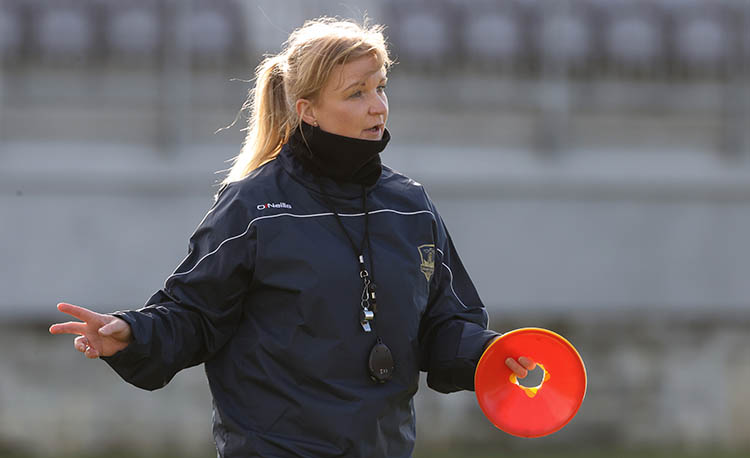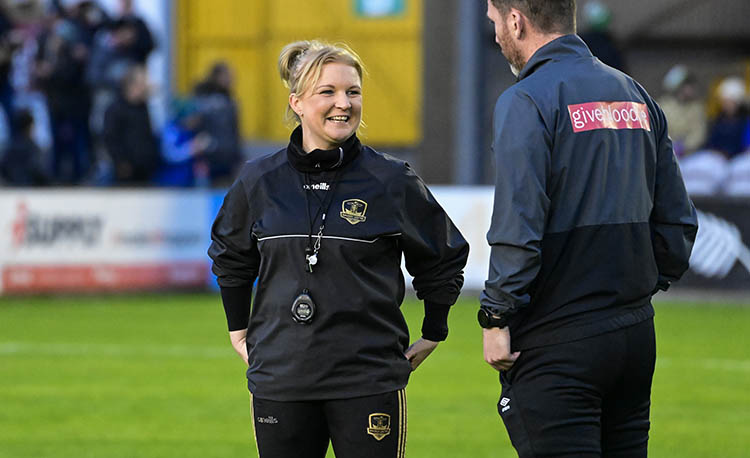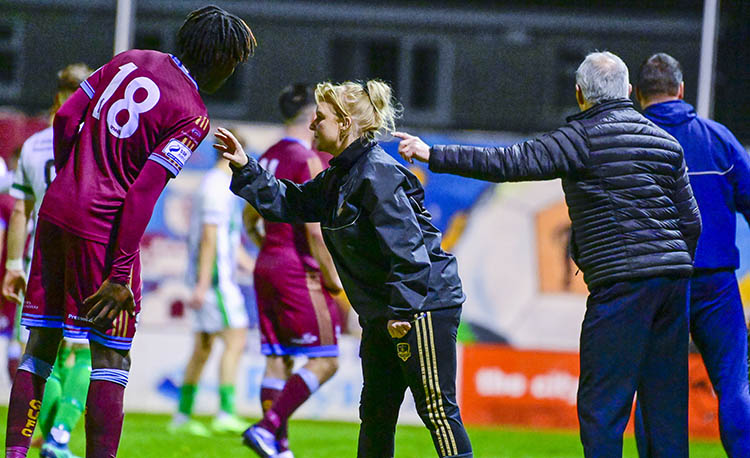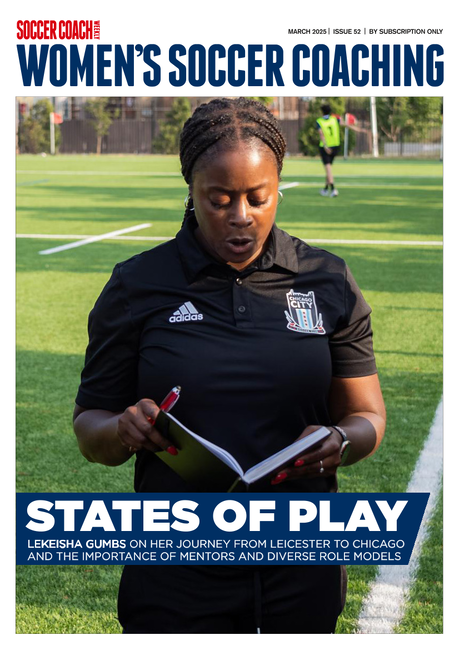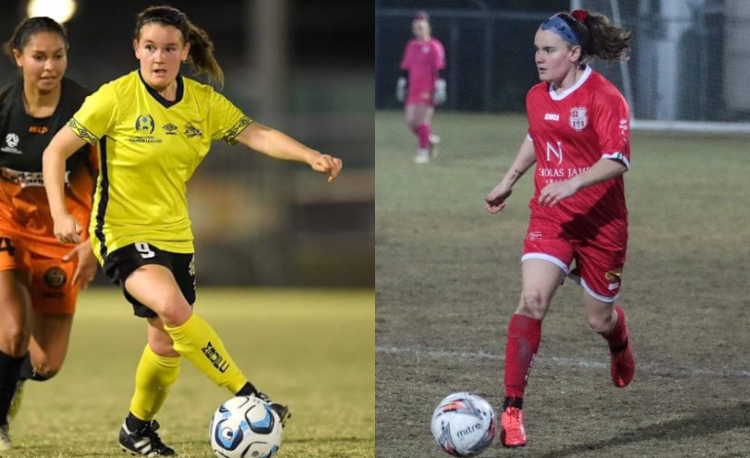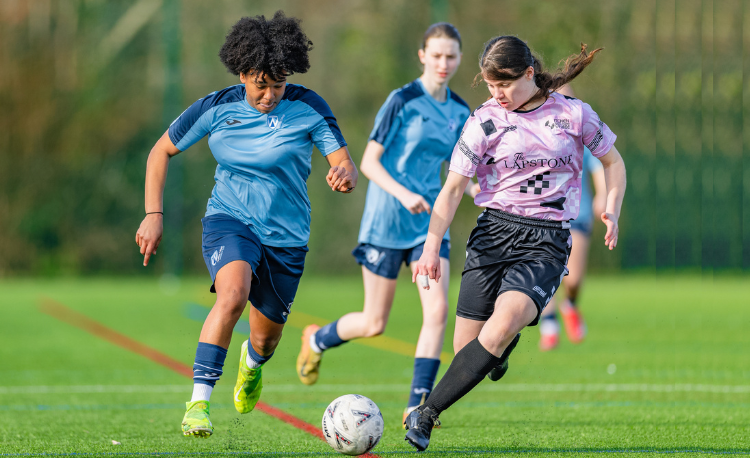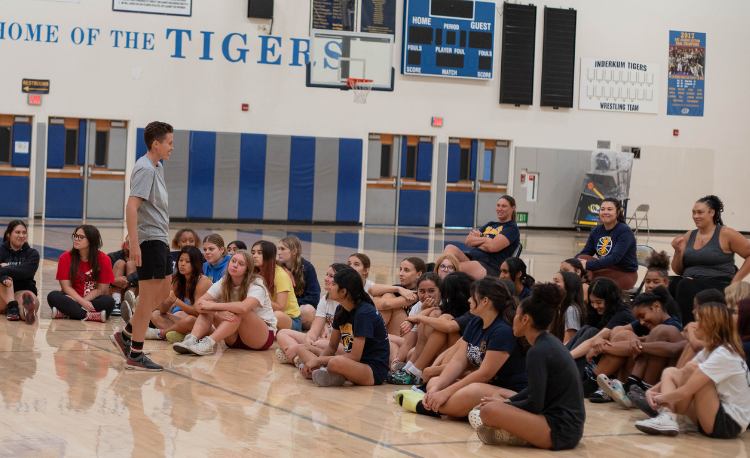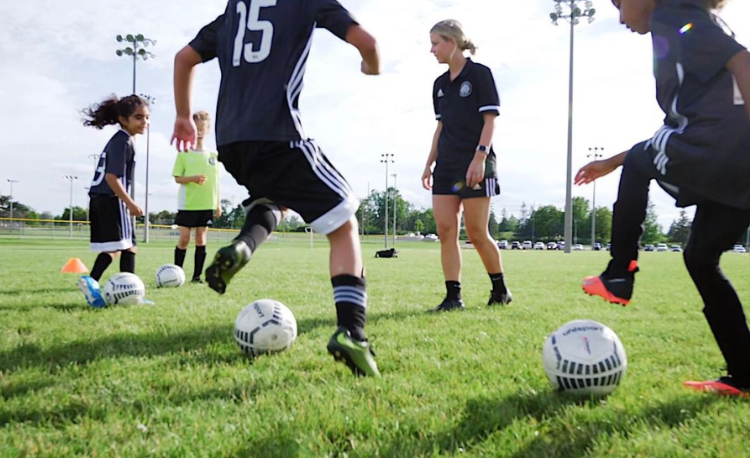You are viewing
1 of your 3 free articles
First among equals
Coaching Adviceby Lisa Fallon
The first Irishwoman to coach in men’s soccer, Lisa Fallon hopes to be a role model for the next generation. Steph Fairbairn meets her and discovers the unlikely inspiration that showed her it wasn’t a man’s world
Growing up in Dublin in the 1980s, Lisa Fallon had one female soccer role model - Gabriella Benson.
A woman working in a male-dominated environment, Benson oversaw a professional men’s team - unprecedented at that time.
There was one problem. Benson was fictional – the lead character in UK television series The Manageress.
It still had an impact on the teenage Fallon, watching back home in Ireland.
“It was the first time I ever saw a woman in football,” Fallon told Women’s Soccer Coaching. “It was incredible.”
“I don’t know, if I had never seen it, if I would have pursued it [a career in soccer]. It just goes to show that whole thing of ‘you can’t see, you can’t be’”.
Fallon went on to become Ireland’s first female head coach of a men’s pro club. She was also the first female pundit on men’s professional matches on Irish TV.
A woman working in a male-dominated environment, Benson oversaw a professional men’s team - unprecedented at that time.
There was one problem. Benson was fictional – the lead character in UK television series The Manageress.
It still had an impact on the teenage Fallon, watching back home in Ireland.
“It was the first time I ever saw a woman in football,” Fallon told Women’s Soccer Coaching. “It was incredible.”
“I don’t know, if I had never seen it, if I would have pursued it [a career in soccer]. It just goes to show that whole thing of ‘you can’t see, you can’t be’”.
Fallon went on to become Ireland’s first female head coach of a men’s pro club. She was also the first female pundit on men’s professional matches on Irish TV.
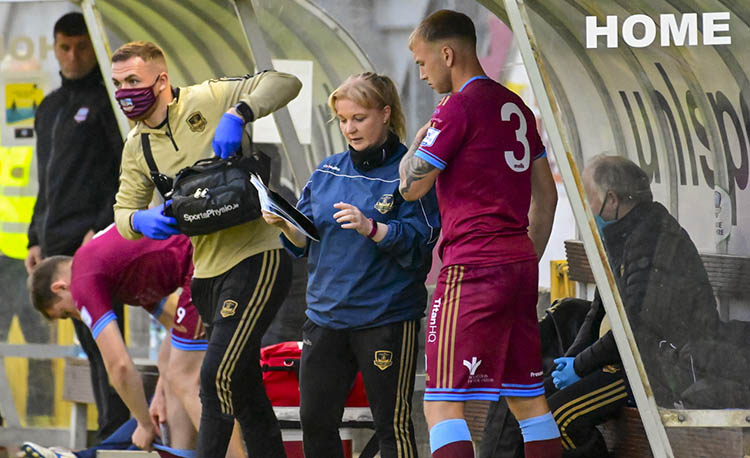
Lisa Fallon gives out instructions during her spell as first-team coach at Galway United and, inset, Cherie Lunghi as Gabriella Benson in 1980s UK TV series The Manageress
I put it to her that she is the 21st century Gabriella Benson - a trailblazer and role model for many females working in, or aspiring to work in, soccer. And she’s real.
It’s something that Fallon is aware of: “I am conscious of it,” she admits. “It’s not what drives me, but I am very conscious of the responsibility that it brings.
“It’s actually great inspiration to me. When you get your difficult days - the days where you think ‘is it worth it?’, when you’re faced with challenges you shouldn’t have to face, and it’s purely because you’re a female - those people inspire me to keep going.
“Our responsibility is to make sure it’s easier for the next generation...”“They make it important that you don’t give up and you continue to drive forward.”
For Fallon, driving forward is not just about her roles, her career or even her teams. It’s about making soccer an industry, and a sport, where women can not just survive, but thrive, without fighting for the right to do so.
She said: “We have the responsibility to make sure it’s easier for the generation that comes next; that they don’t have to fight the battles we did just for a level playing field.
“If this generation can achieve that, hopefully loads of women can kick on and just be who they are, what they want to be and achieve what they can.
“Then the conversation is no longer about being a woman, it’s about the quality of the coach that you are, or the quality of the analyst you are, whatever role you’re in.”
For those of us that look at Fallon’s career as an example of what a woman can achieve in a male-dominated world, her quality shines through.
As a player, she featured for a number of clubs including Southampton and Gillingham in England, and St Patrick’s Athletic in Ireland.
Her media work began in 2007 when she became an afternoon sports anchor on Dublin’s 98FM. That same year, she began her coaching career, gaining her KickStart/ PDP 1 and 2, some of the first rungs on the Football Association of Ireland’s qualification ladder.
Now a Uefa Pro Licence coach, Fallon’s career has thus far been an intricately interwoven patchwork of analysis and coaching roles.
A long stint as a Gaelic sports reporter for Irish radio station Today FM, from 2008 to 2015, ended when Fallon got the opportunity to go full time at Cork City FC, where she progressed from head of football analysis to the men’s first-team coach.
Related Files
WSC-013-first-among-equals.pdfPDF, 5.5 MB
Fallon credits those initial years as an analyst as being the foundation for her success as a coach.
“The analysis route was so beneficial to me in hindsight,” she said. “You’re watching the game tactically and trying to figure out how to prepare the team to play against that side or to expose that weakness. So I was doing a lot of stuff that transferred into coaching.
“What does that look like when you talk to the team and prepare them for it? How does that then transfer onto the pitch? Then what does that look like in a team performance when you add in the opposition?
“That whole process came to me from analysis. I never had any experience playing in the men’s game, obviously, but I got 10 great years of experience analysing the men’s game and looking at how we take on teams, how we tactically adjust, how we expose weaknesses and how we protect ourselves from their strengths.
“Doing that at the highest level was such a massive learning opportunity for me and it was only really when I became a head coach that I started to draw on the value of all those experiences. I draw so much from those 10 years as an analyst into my coaching repertoire and what we deliver on the pitch.”
With the exception of a few early roles, and recent stints as a game and tactical strategy coach at Chelsea Women, and head coach of English second-tier side London City Lionesses, the bulk of Fallon’s career has been spent delivering in the male game.
Roles at, among others, Shamrock Rovers FC, the Irish Men’s University Squad and Castleknock Celtic FC preceded her time at Cork City; working as support staff for the Northern Ireland senior men’s team went alongside it.
In November 2020, having left London City to return to Ireland for family reasons, Fallon returned to the men’s game, as head coach at Galway United.
“I was always doing my sessions with males players. It was very normal to me...”She was the first female coach in the club’s history and, alongside manager John Caulfied, she helped lead Galway to a second place finish in Ireland’s second tier.
With their season now over, Fallon has departed for a role with Fifa, in the technical division of their high-performance departments.
She will likely continue as an analyst and co-commentator for RTE, Ireland’s national TV and radio broadcaster, and maintain her position as a non-executive director for Paralympics Ireland.
I ask Fallon if working in the men’s game was a natural progression, or an active choice. She says it was the former.
“I probably got the opportunities because managers recognised a potential in me that I probably didn’t really know I had,” she said.
“Over time, you have to work on your knowledge and your confidence, you have to learn the game and learn the standards. As you progress through your coaching badges, your knowledge increases and therefore your confidence increases.
“All the way through, I was always doing my sessions and my assessments with male players, because that’s where I was working. So that was very normal to me.
LISA ON THE NUANCES BETWEEN WOMEN’S AND MEN’S SOCCER
“There are slight nuances between the women’s and men’s games.
“Sometimes the opposite side full- back positioning can be slightly different because the big diagonal in men’s football is slightly different to that in women’s football.
“In terms of group dynamics, I think working with male players does ask different questions of me as a coach, and I have to draw on slightly different skillsets.
“Every player you’ve ever coached will ask different questions of you, though, because of their personalities, their learning capacities and the way they receive information.
“Ultimately, the game is the game. It’s about the transfer of information and knowledge to help make players better and to win football matches.
“It definitely does draw in different skillsets, but the nuts and bolts of what you’re actually coaching are very similar.
“I found the women’s game was extremely tactical at Chelsea. I think people who work in men’s football sometimes underestimate how advanced the women’s game is in terms of tactical and technical preparation.
“There is no difference at the highest level of the women’s game to what goes on at the highest level of the men’s.”
‘BACK YOURSELF LIKE YOU WOULD A PLAYER’: Lisa Fallon’S ADVICE TO WOMEN CONSIDERING COACHING IN THE MALE GAME
TELL YOURSELF WHAT YOU WOULD TELL A PLAYER
“If you’re developing a player, you’re going to tell them they’ve got to take risks and put themselves into a slightly vulnerable position to improve. There are going to be little failures along the way, they’re going to make mistakes. As a coach, you would tell those players, learn from them and keep going. Do what you say, and back yourself in that way.”
SURROUND YOURSELF WITH GOOD PEOPLE
“Get yourself a mentor and have people there that you can talk to when you have a difficult day, or when you make a mistake, or when you have those moments of self-reflection, and you think: ‘How can I improve?’, ‘What did I do well?’.”
PUT YOURSELF IN A SAFE, VULNERABLE POSITION
“Allow yourself to go in and stretch but without over exposing yourself. Go to the limits that you feel comfortable with in terms of stepping into a level that might challenge you, but that doesn’t necessarily push you beyond the levels of your knowledge.”
EMBRACE THE CHALLENGE
“If you are not pushing, and if you are not feeling a little bit uncomfortable, a little bit vulnerable and challenging yourself, then you are not growing and you need that for progression. Sometimes that does mean taking a step into a little bit of the unknown or into a territory you haven’t been before. Don’t fear that - you should embrace it.”
“Did I feel I got challenges that maybe some male coaches in the same environment didn’t get? I would say, from the players, very little. But occasionally, yes, I definitely did.”
So how has she learned to continue in the face of those challenges?
“One of the greatest pieces of advice I ever got was never take criticism from somebody you wouldn’t take advice from,” she said. “I keep that one in my back pocket all the time.
“I’m always open to be critiqued, I’ve no problem with that. But when people critique you, challenge you or criticise you just because you’re a woman, that’s not acceptable.
“Over the years, I’ve learned to put those things in their place in my own mind. It’s really important for me, because often I found those challenges were designed to try and affect me or distract me from performing for my team. I would never allow them to achieve that.
“It was always really important to stay focused on my role and what I need to do for the team in that moment. Then, when I have time to reflect, I can decide whether to deal with it or just discard it, because sometimes by not paying it any attention you give it the response it deserves.”
In the analysis world, Fallon says people often questioned why she was commentating on male matches, not realising the majority of her career had been in the men’s game. And in the coaching world?
“I was very fortunate to work in environments where there was a lot of respect and really good cultures,” she says. “I think that was very important in terms of me being able to develop as a coach, that you got that respect from the players and the people you worked with.
“Honestly, you do feel you have to know twice as much as some people just to justify being there. But in some respects, by working extra hard and having extra knowledge, it gives you that bit of credibility other people maybe don’t have.”
Having spent 30 minutes listening to Lisa enthuse about the game, I had to know one thing - what’s her favourite thing about soccer? She gave me the response the question deserved.
“I think the real joy of it is what football does to the people around you - how sport can just make such an impact on so many people,” she told me.
“I think that’s a real responsibility that we should never take for granted; it’s a great outlet for people.
“It’s a great medium to push yourself to your limits in terms of performance and try to see how good you can be, what kind of success you achieve and how you have to work so hard for that.
“I also love how winning makes other people feel and how success looks so different to everyone.
“Sport is such an important thing for all of us. I just love how it can make people smile and feel.” WSC
“That critical lens now is starting to be more on your critiquing, rather than you being a woman. That’s a great place for us to be...”
HEAR MORE FROM LISA, INCLUDING HER THOUGHTS ON BEING JUDGED FOR WHAT SHE SAYS NOT HER GENDER, ON OUR PODCAST — CLICK HERE TO DOWNLOAD IT
Newsletter Sign Up
Newsletter Sign Up
Discover the simple way to become a more effective, more successful soccer coach
In a recent survey 89% of subscribers said Women's Soccer Coaching makes them more confident, 91% said Women's Soccer Coaching makes them a more effective coach and 93% said Women's Soccer Coaching makes them more inspired.
*includes 3 coaching manuals
Get Inspired
All the latest techniques and approaches
Women's Soccer Coaching offers proven and easy to use soccer drills, coaching sessions, practice plans, small-sided games, warm-ups, training tips and advice.
We've been at the cutting edge of soccer coaching since we launched Soccer Coach Weekly in 2007, creating resources for the grassroots youth coach, following best practice from around the world and insights from the professional game.
